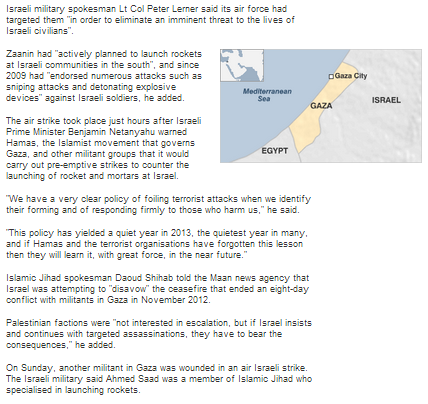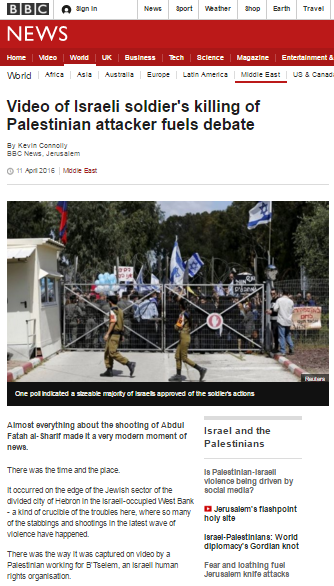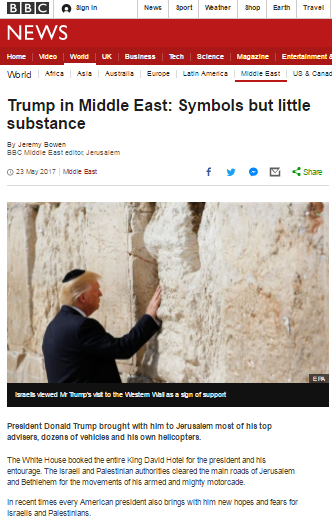On the morning of January 22nd visitors to the BBC News website’s Middle East page were informed that “Israel Gaza strike kills militants” and in the sub-heading:
“Two Palestinian militants are killed by an Israeli air strike in the Gaza Strip, Palestinian and Israeli officials say.”
That link originally led to a report with the rather more ambiguous title of ” ‘Two militants’ dead in Israel Gaza Strip air strike”, although it was unclear from the BBC’s use of punctuation whether it was in doubt about the number of terrorists killed or their title.
The report opened with an interestingly captioned photograph:
“Israel says that airstrikes are necessary to protect the south of the country from rocket attacks” [emphasis added]
The report itself also included a plethora of statements using the familiar “x says” theme. [emphasis added]
“Two Palestinian militants have been killed by an Israeli air strike in the Gaza Strip, Palestinian and Israeli officials say.
The Israeli army said that one of the dead was Ahmad Zaanin, a militant who fired rockets during the funeral of former PM Ariel Sharon last week.
A Hamas radio station said the two men were members of Islamic Jihad.”
Although Za’anin was later claimed by the Palestinian Islamic Jihad as a member of the Al Quds brigade, postings on PFLP sites and social media described him as a member of the PFLP, as did the IDF in its related statement. It is of course not unusual for terrorists to be claimed by more than one group.
The report went on:
“The Islamist group has been blamed by Israel for a recent surge in cross-border rocket attacks.
The Israeli military said the overnight strike in Gaza had been necessary “to eliminate an imminent threat to the lives of Israeli civilians”.
It said Mr Zaanin had been behind several recent rocket and shooting attacks in southern Israel.
Locals in Gaza were reported by the Reuters news agency as saying that Mr Zaanin and another militant – a relative of him [sic] – had been sitting in a parked car when it was hit by a missile.”
The article ended:
“There has been intermittent violence along the border since a ceasefire ended an eight-day conflict between Israel and militants in Gaza in November 2012.
Israel withdrew its troops and settlers from the Gaza Strip in 2005 under the orders of Mr Sharon.”
Actually, although the disengagement from the Gaza Strip was Ariel Sharon’s initiative, the plan was endorsed by the cabinet and by the Knesset. Contrary to the suggestion made in this BBC report, Israeli prime ministers do not issue “orders” to civilians.
The use of language such as “Israel says that airstrikes are necessary to protect the south of the country from rocket attacks” and “The Israeli military said the overnight strike in Gaza had been necessary “to eliminate an imminent threat to the lives of Israeli civilians”” is all the more significant when one considers that this article does nothing beyond the vague and oblique mention of “intermittent violence” to provide BBC audiences with the background and context to the event which is its subject.
The BBC’s last report on Gaza Strip-related incidents was published six days previously on the morning of January 16th. Since that report appeared, numerous incidents of terrorists targeting civilians with missiles have taken place.
Just before 9 p.m. on the evening of January 16th air-raid sirens sounded again in Ashkelon (after the barrage of at least five missiles the previous night) as a missile was fired from the Gaza Strip, but fell short. Unprotected schools in the area were closed the next day.
Late in the evening on January 18th a missile fired from the Gaza Strip hit the Sdot Negev area. The IDF later responded to that attack by targeting two terror sites.
On January 19th the IDF targeted the PIJ’s Ahmad Sa’ad who was responsible for the firing of the barrage of missiles at Ashkelon days beforehand.
Early on the morning of January 20th another missile was fired from the Gaza Strip and in the evening two missiles were fired at Eilat from the Sinai, with that attack later being claimed by the Salafist group Ansar Bayt al-Maqdis. Shortly before midnight, a further three missiles were fired from the Gaza Strip at the Eshkol region. 
On the morning of January 21st an improvised explosive device was activated near the fence marking the border between Israel and the Gaza Strip. In the evening more missiles were fired from the Gaza Strip at civilian targets in Israel.
None of the above was reported by the BBC at the time and so BBC audiences lack the context which would enable them to view the ‘Israel says’ statements used by the BBC in their proper light.
Later on in the morning, some eleven hours after initial publication, that article was replaced by an extended version with a less ambiguous title, but still with a notable photo caption opening the report.
“Israel says air strikes are necessary to protect its territory from rocket and mortar attacks”
Actually, Israel is trying to protect the lives of human beings – its citizens – rather than “its territory”.
The amended version does mention the strike on Ahmed Sa’ad on January 19th, but fails to note his connection to the missile attacks on Ashkelon three days before.
“On Sunday, another militant in Gaza was wounded in an air Israeli strike. The Israeli military said Ahmed Saad was a member of Islamic Jihad who specialised in launching rockets.”
However, the numerous missile attacks launched from the Gaza Strip and Sinai during the past week are still not reported in this article and audiences are again left without context.










